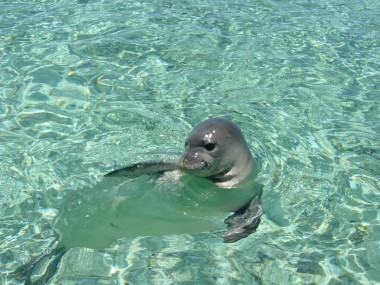Mediterranean monk seal/Monachus monachus
Description of the species: The Mediterranean monk seal is a sea mammal from the seal family. It only lives in the Mediterranean, where its total population has been estimated at 320-475. It can grow up to 3.5 metres, weigh up to 400 kg and reach an age of around 45 years old. A hundred years, ago it was spread throughout the Adriatic, though today it is seen as a regionally extinct species. However, in the last decade adult specimens have been seen every year in two or three localities in the Adriatic. Its shelters in the Adriatic are caves with gravely beaches or stone-plated caves.
Reasons for threat: The reason for the decrease in their number in the Adriatic is not known, as there have been no systematic studies. However, it is thought that the principal reason for their disappearance is illegal hunting due to the competition which they represent to fishing activities.
Protection: The species is very strictly protected by the Ordinance on designating protected and strictly protected wild species (Official Gazette 7/06 and 99/09). According to the Ordinance on penalties for damage caused by illegal actions against protected animal species (Official Gazette 84/96), the penalty for killing a Mediterranean monk seal is 100,000 kuna.

Illegal hunting can be reported on the following phone numbers:
Inspectorate for the Protection of Nature
Istria and Kvarner - HQ in Rijeka, mr. sc. Ivanka Jelenić, senior inspector, tel: +385 (0)51 311302; mob: +385 (0)98 406313
e-mail: ivanka.jelenic@min-kulture.hr
Zadar region- HQ in Zadar, Damir Mitrović, senior inspector,
tel: +385 (0)23 211129; mob: +385 (0)98 406979
e-mail: damir.mitrovic@min-kulture.hr
Šibenik and Split regions - HQ in Šibenik, Davor Cukrov, senior inspector
tel: +385 (0)22 215800; mob: +385 (0)98 406982
e-mail: davor.cukrov@min-kulture.hr
Dubrovnik region - HQ in Dubrovnik
Vesna Daničić, inspector
tel: +385 (0)20 323191; mob: +385 (0)98 407121
e-mail: vesna.danicic@min-kulture.hr
Source: www.dzzp.hr State Office for the Protection of Nature, Mrs Katja Jelić
Video
Current news
 Macrocruise charter agency
Additional discount on the boat rental price of betw
Macrocruise charter agency
Additional discount on the boat rental price of betw

















